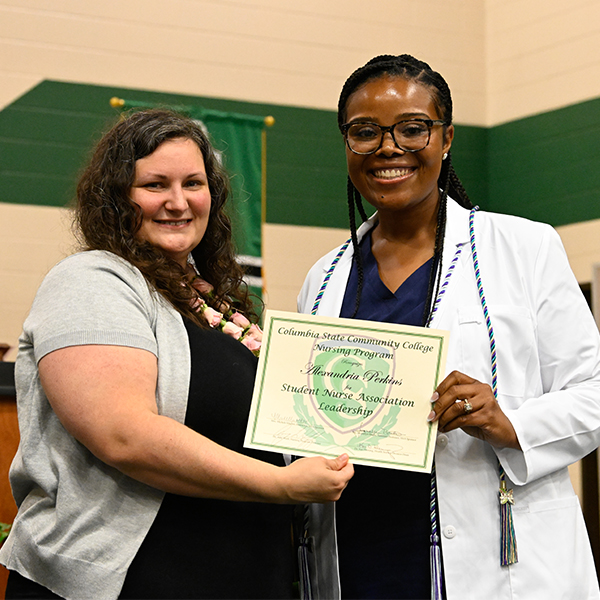General Admission Requirements
Columbia State’s nursing program has enrollment limitations. This necessitates the screening of applicants, utilizing selection criteria that have been established for the program. General criteria for consideration are stated below. These requirements apply to all nursing applicants, including licensed practical nurses and Paramedics applying for the LPN/Paramedic to RN Transition Pathway.
Note: Criminal background checks are a requirement at most affiliated clinical training sites. Based on the results of the criminal background check or drug screen, an affiliated clinical site may determine to not allow a student’s presence at their facility. This could result in the inability to successfully complete the requirements of a specific course and the program. More information is available from nursing program director.
- Meet all College general requirements for admission as a degree-seeking student as stated in the catalog and be accepted to the college prior to submitting an admission application to the Nursing Program.
- Review “Programs with Special Admissions Requirements,” in the Columbia State Catalog.
- Exemption from or satisfaction of Learning Support (LS) competencies in reading, writing and math as determined by college placement standards prior to submitting an admission application to the Nursing Program.
- Applicants must have a composite ACT score of 19 or higher (900 or greater for SAT) to be considered for admission. In keeping with the college’s placement policy, individuals who have satisfied all required LS deficiencies will receive nursing admission points equivalent to an ACT composite score of 19. Likewise, students holding bachelors or higher degrees without an ACT score but with passing transferable English and Math credit on a college transcript will receive nursing admission points equivalent to an ACT composite score of 19. (NOTE: while a composite ACT score of 19 is the minimum accepted, the competitive nature of the admission process encourages higher scores.)
- Earned a cumulative college-level grade point average of 2.50 or above on a 4.0 scale for gen ed courses required for the AAS in Nursing degree.
- If less than 12 hours of applicable gen ed hours have been completed, then a cumulative (all college history) of 2.5 or above is required. The high school GPA is used for students who have fewer than 12 college credit hours attempted.
- An applicant with no college level credit that has no high school GPA must have an actual ACT composite score of 19 or higher.
- STUDENTS PREVIOUSLY ENROLLED IN ANOTHER NURSING PROGRAM: If the applicant has previously been enrolled in another Nursing Program within the past three years of the date of application, the applicant is considered a transfer student.
Transfer applicants seeking advanced standing and credit for prior nursing coursework are evaluated for transfer credit on a case-by-case basis. Eligible transfer applicants may be accepted to the nursing program on a space-available basis. Nursing course credit must be within 3 years and a grade of “C” or better is required for all transferred nursing courses. Eligible transfer applicants may be asked to validate clinical skills and/or knowledge obtained from previous nursing courses.
To be eligible for entry into the Nursing Program, transfer applicants must:
-
- Be admitted/currently enrolled at Columbia State (including official transcripts from all colleges attended).
- Complete all required Learning Support classes (or be permanently exempt from all Learning Support requirements).
- GPA: ≥ 2.5 (on a 4.0 scale) based on most recent grades for completed college-level general education courses required for the AAS Nursing (MATH 1530, PSYC 1030, BIOL 2010, BIOL 2020, BIOL 2230, PSYC 2130, Humanities elective, & ENGL 1010).
- If applicant has fewer than 12 attempted college credit hours, high school GPA will be used.
- If applicant has 12 or more total attempted college credit hours but fewer than 12 credits which are required for the AAS Nursing program of study, then the cumulative, weighted average of all prior college level course work will be used.
- Have a grade of “C” or better in all required science and math courses.
- Complete a Nursing Program Admission Application for Transfer Nursing Students (provided upon request by the Nursing Program Director).
- Request a letter to be sent from the Dean/Director of the nursing program in which the student was previously enrolled directly to the Columbia State’s Nursing Program Director, stating that the student is in good standing and eligible to continue in or return to that previous program.
- Submit transcripts from all colleges attended, including Columbia State, attached with the transfer nursing application.
- If nursing courses are older than 3 years, transfer applicants may seek traditional admission to Columbia State’s nursing program.
- Transfer applicants who are not seeking advanced standing or credit for prior nursing coursework but have nursing credit from another program within the past 3 years, may seek traditional admission to Columbia State’s nursing program. In this situation, students are still considered transfer students and must request a letter to be sent from the Dean/Director of the nursing program in which the student was previously enrolled directly to the Columbia State’s Nursing Program Director stating that the student is in good standing and eligible to continue in or return to the previous program.
- The standard admission/readmission requirements, rating criteria, and selection processes used for those seeking traditional admission to the nursing program will also be used for transfer students.
- Students who exit any nursing program prior to the second semester for any reason (voluntary or academic) are not eligible for admission/readmission to the Columbia State Nursing Program. The possibility of a formal appeal based on extenuating circumstances, if applicable, may be discussed with the Nursing Program Director.
- Students who have 2 attempts in any nursing program(s) are ineligible for admission/readmission into the Columbia State Nursing Program.
- In cases of transfer or re-admission, if three or more years have elapsed since enrollment in a nursing program, the nursing courses must be repeated.
- If five or more years have elapsed, the following requirements apply:
- Anatomy and Physiology courses must be repeated.
- All current application/enrollment requirements apply.
- In compliance with the Americans with Disabilities Act, all applicants and admitted students must be, with reasonable accommodation, physically and mentally capable of performing the essential functions of the program as outlined in the Tennessee Board of Regents (TBR) system and the Southern Council on Collegiate Education for Nursing. Please read the following Nursing Core Performance Standards for all TBR nursing programs (TBR Policy 2:03:00:00).
- Communication abilities sufficient for interaction with others in verbal, nonverbal and written form.
- Interpersonal abilities sufficient to interact with individuals, families and groups from a variety of social, emotional, cultural and intellectual backgrounds.
- Critical thinking ability sufficient for appropriate clinical judgment and utilization of the nursing process.
- Physical abilities sufficient to move from room to room and maneuver in small spaces.
- Strength to perform patient care and assist with patient mobility.
- Gross and fine motor abilities sufficient to provide safe and effective nursing care.
- Auditory ability sufficient to monitor and assess health needs.
- Visual ability sufficient for observation and assessment necessary to provide safe and effective nursing care.
- Tactile ability sufficient for physical assessment and intervention.
- Ability to be responsive within appropriate time periods.
Additional Requirements (After Admission)
Once admitted, students are required to submit documentation of the following entry requirements:
- Health Requirements: All nursing students must submit evidence of good health by returning a completed Physical Examination form. Required forms are given to students who are offered admission into the Nursing Program. It is mandatory for all documentation to be submitted before or by the deadline date given. If the documentation is not completed by the stated date(s), the offer of Nursing program admission is forfeited.
- All students must have a:
- Documented negative TB Skin Test and/or Chest X-Ray yearly. An initial two-step TB Skin Test must be within three months of the start of the program as a condition of participation in clinical rotations. After the initial TB skin test another TB skin test is required within two (2) to three (3) weeks. If the second TB skin test is positive, a baseline chest X-ray will be required. Thereafter, a TB skin test Risk Assessment is completed annually unless exposure occurs.
- Vaccine documentation or evidence of Immunity for:
- Rubella (positive titer).
- Varicella Zoster (chicken pox) (positive titer).
- Rubeola titer (positive titer).
- Mumps (positive titer).
- Hepatitis B: Evidence of vaccine series with titer results or evidence of vaccine series in progress followed by titer results.
- Tetanus/diphtheria booster within the past ten years.
- Influenza immunization (seasonal deadline).
- Other vaccinations may be required by specific clinical affiliates.
- Some clinical affiliates MAY grant access to students who decline vaccinations (the Health Records Clerk can provide a declination form on request.
- All students must have a:
- In order to meet Clinical Affiliate expectations, students coming into health sciences programs are required to submit copies of current BLS (Basic Life Support) Provider certification compliant with American Heart Association (AHA) or American Red Cross guidelines. Clinical affiliates accept neither AHA HeartCode® (blended/hybrid style) nor AHA HeartSaver® (by-stander/public) versions. BLS certification classes are offered by Columbia State Community College or the American Heart Association / American Red Cross. Certification must be maintained continuously for the duration of program enrollment.
- Malpractice Insurance: Malpractice insurance is required for all clinical nursing courses. A group policy is available. The fee is assessed annually as a part of course registration.
- Health Insurance: Students are responsible for all costs incurred related to health problems, including injuries occurring during clinical experiences. Students must provide evidence of health insurance coverage before clinical assignments can begin.
- Criminal Background Checks and routine drug screens are required by most affiliated clinical training sites as a condition of participation in clinical education. Based on the results, an affiliated clinical site may determine to not allow your presence at their facility. This could result in the inability to successfully complete the requirements of a specific course and the program. More information is available from the program director. In addition, applicants who have been convicted of a crime other than a minor traffic violation may be ineligible for licensure.
- A 10-panel drug screen and urine alcohol screen are required by clinical facilities as a component of the clinical access clearance process. These items are ordered through Truescreen with results available to Columbia State’s Health Science Records Clerk electronically. Clinical agencies may deny a student access to the facility based on the results of the background check or the drug screen. This could result in a student being unable to successfully complete the requirements of a course or the program.










